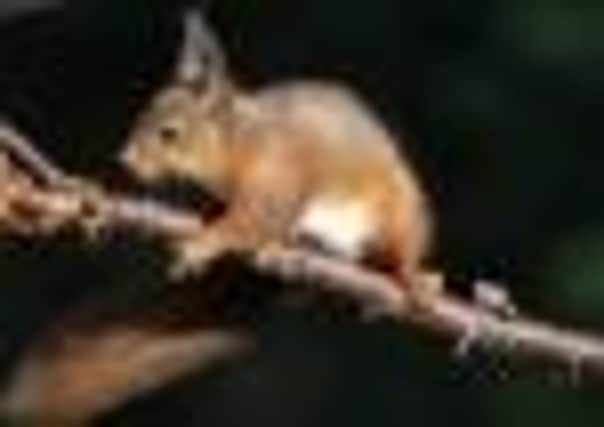The red squirrel: losing the battle for survival


A deadly virus swept through the colony of red squirrels on the 80-acre Paxton estate in Berwickshire and left no survivors.
The lethal pox was brought by grey squirrels, the invasive cousin of the smaller reds.
Advertisement
Hide AdAdvertisement
Hide AdOther than a few bodies on woodland paths, it was as though the population of about 30 red squirrels had never been there at all.
All that is left is a now-disused hide constructed to enable members of the public to view the animals, with the odd hazelnut still scattered outside.
Over the years, thousands of people have flocked to Paxton to see the characterful rodents, and the estate developed a reputation as one of the best places in the Borders to spot them.
Surrounded on both sides by rivers, with the Tweed to the south and the Whiteadder to the north, it seemed relatively safe from the onslaught of grey squirrels.
Staff on the estate were vigilant with their air rifles, destroying any grey that was spotted.
Despite the efforts to keep them out, the greys swept onto the land, carrying deadly squirrel pox.
Whereas the pox is harmless to the greys that carry it, the disease kills reds within weeks. After infection, the creatures break out in lesions that leave them unable to eat and they starve to death.
John Home Robertson, former laird of Paxton who bequeathed the land to the nation in 1988, discovered the pox-ravaged corpse of a tiny red on Christmas Day.
Advertisement
Hide AdAdvertisement
Hide AdHe picked it up and took it to a taxidermist to have it stuffed.
“It might be Paxton’s last squirrel,” he says. “However, I don’t know if I can bear to have it on display because I will get so upset every time I see it.”
Mr Home Robertson, a former Labour MP and MSP, has taken the loss of his beloved reds hard.
“I am very distressed about the fate of these native mammals in my home area,” he says. “These are lovely little creatures which have been here forever.
“It was great to be able to share them with other people. It was an absolute joy. Then they were suddenly wiped out overnight.”
For about two decades, the estate staff have been nurturing the red squirrels, putting out hazelnuts and protecting their habitat.
When the first grey squirrel arrived 12 years ago, staff shot any they saw.
However, they were fighting a losing battle.
“If this is a war, the reds are losing,” says Mr Home Robertson.
Advertisement
Hide AdAdvertisement
Hide AdHe believes it is only a matter of time before a similar fate strikes red squirrels in other areas, and eventually reaches the Highlands, their final stronghold.
He is sceptical that trapping alone will be successful and believes the only way to protect the reds in the long term is through a vaccine, which could be fed to them using bait.
Scientists at the Moredun Research Institute in Penicuik are trying to develop a vaccine.
“If we just go on the way we are now then they are doomed,” he says.
“This tragedy in this corner of rural Berwickshire should be a warning for the whole of Scotland. What has happened over a few short weeks at Paxton could be repeated all too rapidly all over Scotland.
“I make this heartfelt plea to government and other agencies to prioritise that research,” Mr Home Robertson adds. “What’s the good of using scarce cash and skills to introduce beavers, sea eagles and even giant pandas to Scotland if we can’t save an iconic native Scottish mammal from extinction?”